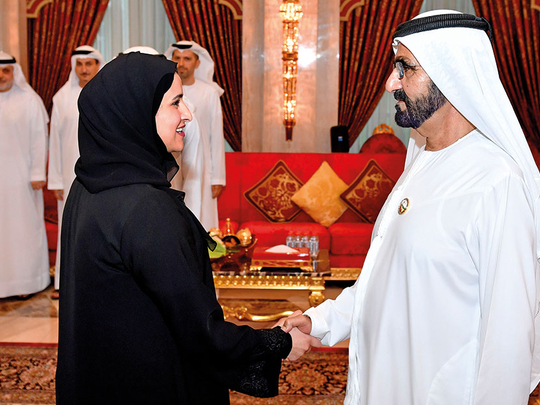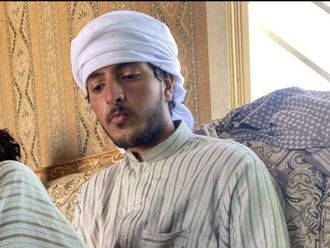
Minister for Advanced Sciences is an accomplished engineer
The council is geared at regularly reviewing the UAE’s policy for science, technology and innovation in the UAE, as well as providing decision-makers with advice based on scientific knowledge.
Al Amiri is also the Emirates Mars Mission Deputy Project Manager — Science Team Leader at the Mohammad Bin Rashid Space Centre (MBRSC). She has worked on building technical and operational efficiencies for the MBRSC. Prior to this, Al Amiri was the director for the Department of Research and Development at the Emirates Institution for Advanced Science and Technology, which is now the MBRSC.
Al Amiri holds a master’s degree in computer engineering from the AUS College of Engineering.
ALSO READ:
Mohammad Bin Rashid reveals reshuffled UAE Cabinet
These are the new faces in reshuffled UAE Cabinet
After her appointment as minister yesterday, her colleagues at MBRSC tweeted: “We congratulate Her Excellency Sarah Al Amiri, Chairman of the UAE Council of Scientists, who has been appointed the Minister of State for Advanced Sciences.”
Future plans
While the main thrust of this new ministry is yet to be announced, it is likely that the ministry’s focus will be on creating a generation of scientists and pushing advanced sciences in the UAE agenda, specifically space science.
The UAE in April launched its national space programme, a 100-year national programme that includes the building of the first scientific city on Mars. The programme will also include the Arab Space Discovery Programme, and launching the largest forum for international scientists specialising on the Red Planet. Part of the programme is the UAE satellite-manufacturing complex.
In 2014, the UAE announced the Hope Mars Mission, which is set to send an unmanned probe to the Red Planet by 2020.
Over the years, the UAE has already invested about Dh20 billion in the space sector.
Environmental engineering expert to ensure food security
She began her career soon after graduating from one of Europe’s leading engineering universities, with specialisation in Development and Design Engineering. She received her bachelor’s and master’s degrees in Mechanical Engineering from the Rheinish-Westphalian Technical University (RWTH) in Aachen, Germany.
Al Muhairi gained prominence in the field of environmental engineering through her professional experience of over 10 years working with well-known organisations in the UAE and Germany.
She began her professional journey with the UAE Ministry of Environment and Water, where she was appointed an expert to supervise its large projects, including setting up of the Shaikh Khalifa Bin Zayed Al Nahyan Centre for Marine Research in Umm Al Quwain, and the UAE-wide Integrated Waste Management Project to convert waste into energy.
Al Muhairi has paid great attention to the issue of groundwater depletion in the UAE.
Young minister to implement Artificial Intelligence strategy
Along with the new cabinet reshuffle was the addition of a new ministry — Ministry of Artificial Intelligence, and the launch of the UAE Artificial Intelligence (AI) strategy, announced by His Highness Shaikh Mohammad Bin Rashid Al Maktoum, Vice-President and Prime Minister of the UAE and Ruler of Dubai, on Monday.
Al Olama was previously the Director of the World Government Summit Organisation, and holds a bachelor’s degree in business administration and a diploma in project management and excellence.
Al Olama previously served at the Prime Minister’s Office, Telecommunication Regulatory Authority, Emirates NBD Bank, and is also the Secretary-General of the World Organisation of Racing Drones.
Hessa oversaw development of government services
Hessa Eisa Bu Humaid (right), appointed Minister of Community Development, is a graduate of the Mohammad Bin Rashid Programme for Leadership Development and served as the executive director of the Government Services Sector, Prime Minister’s Office, and had been overseeing the development of government services in the UAE through the Emirates Government Service Excellence Programme.
Earlier, she had assumed several posts, including coordinator general of Khalifa Government Excellence Programme and executive director for Excellence Affairs and project manager at the Prime Minister’s Office as well as customer service development manager at the Dubai Department of Economic Development.
She has a Bachelor’s Degree in Business Science and Focus Marketing from Zayed University and Master’s in Business Administration from American University of Sharjah, an Executive Diploma in Public Administration and Polices from Lee Kuan Yew School, Singapore.
Al Hameli helped develop the Dubai Human Resources Law
He contributed also to developing human resources laws and regulations.
Contribution to develop law
Al Hameli was director of the Dubai Executive Council Affairs between 2005 and 2009 and contributed to developing the Dubai Human Resources Law.
Al Hameli holds a master’s degree in Human Resources from the University of Pennsylvania. He worked as assistant Undersecretary at the government coordination section in the Ministry of Presidential Affairs. He also oversaw the Absher initiative to bolster national cadres’ participation in the job market.
Nussaibah was Cultural Diplomat of the Year 2017
Other positions include serving as a trustee of the Shaikh Zayed Award, the International Prize for Arab Fiction (IPAF or Arab Booker Literary Prize), elected chairman of the Advisory Board of the Middle East Centre at the London School of Economics (2015) and the Alliance Française Foundation in Paris. Nussaibeh is a member on the Board of Directors of the Agha Khan Museum in Toronto, and the president of the Alliance Francaise Abu Dhabi.
Born and educated in Occupied Jerusalem and the UK before settling in Abu Dhabi, Nussaibeh began his career as a journalist in 1967. He also worked as a broadcaster and programme producer and helped in developing Abu Dhabi’s broadcasting and media services.
UAE Cabinet
- December 9, 1971: The first UAE Cabinet is formed with Shaikh Maktoum Bin Rashid Al Maktoum as prime minister and Shaikh Hamdan Bin Rashid Al Maktoum as deputy prime minister. It comprises 20 ministers.
- 1973: In the second Cabinet, Shaikh Khalifa Bin Zayed Al Nahyan is appointed deputy prime minister.
- 1977: The third Cabinet sees Shaikh Hamdan Bin Mohammad Al Nahyan being named deputy prime minister.
- July 1, 1979: The fourth Cabinet is formed under Shaikh Rashid Bin Saeed Al Maktoum. It has two deputy prime ministers, Shaikh Maktoum Bin Rashid Al Maktoum and Shaikh Hamdan Bin Mohammad Al Nahyan. Three new faces are included.
- November 20, 1990: The fifth Cabinet is formed under Shaikh Maktoum Bin Rashid Al Maktoum after Shaikh Rashid’s death. Shaikh Sultan Bin Zayed Al Nahyan is named deputy prime minister.
- March 25, 1997: The sixth Cabinet sees a reshuffle on October 8, 2003. Shaikh Hamdan Bin Zayed Al Nahyan is named deputy prime minister.
- February 9, 2006: The seventh Cabinet is the first led by His Highness Shaikh Mohammad Bin Rashid Al Maktoum, named Prime Minister on January 5, 2004, following the death of Shaikh Maktoum Bin Rashid Al Maktoum. Two women get the portfolios of foreign trade and social affairs. Shaikh Abdullah Bin Zayed Al Nahyan is named foreign minister. The information portfolio is abolished. Five portfolios are created.
- February 17, 2008: The eighth Cabinet features seven new faces and has four women ministers. It expands to 24 ministers and three state ministries are created.
- May 11, 2009: The ninth Cabinet is reduced from 24 ministers to 22.
- March 12, 2013: The 10th Cabinet features four new faces. A Ministry of Development and International Cooperation is formed under Shaikha Lubna Al Qasimi. The ministries of Foreign Trade and Economy are merged.
- July 4, 2014: The 11th Cabinet sees Hussain Bin Ebrahim Al Hammadi become minister of education and Sultan Bin Saeed Al Badi take over as minister of justice.
- February 10, 2016: The 12th Cabinet features a 22-year-old woman minister. The 29-member Cabinet includes eight women and two new portfolios of happiness and tolerance are held by women.












